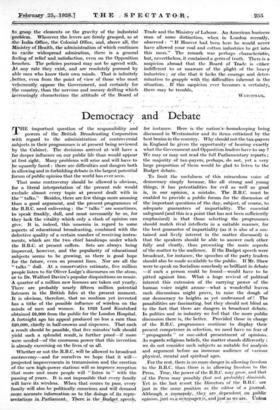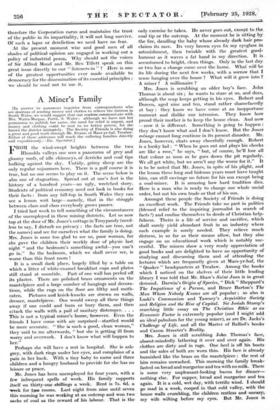Democracy and Debate
THE important question of the responsibility and powers of the ,British Broadcasting Corporation with regard - to the administration of. controversial subjects in their programmes is at present being reviewed 'by the Cabinet; The • decisions- arrived at will have a far deeper influence on our public life than would appear At first sight. Many -problems will arise and will have to pe squarely faced : there are difficulties and -dangers- both in allowing and in forbidding debate in the largest potential forum of public opinion that the world-has ever seen. • , That some controversy should be allowed is -obvious, for a literal interpretation of the • present rule would exclude almost every - topic at present dealt with- in 'the" talks." 'Besides, there are few-things more amusing than a good argument, and the present programmes of the B.B.C. need enlivening : the " talks " are sometimes, to :speak- frankly, dull, • and must- necessarily be so, for they lack the vitality -which only a clash of opinion can give: It is, - indeed, this 'anaemia- - in regard to some aspects of educational broadcasting, combined with the defective quality- of a certain number of receiving instru- ments, which are the two chief handicaps under which the B.B.G. at present suffers. - Sets are- always being improved; however; and the popularity of educational subjects:Seems to be growing, so there is good hope for the future, even on present lines. Nor are all the talks " dull. At a conservative estimate, five million people listen to Sir Oliver Lodge's discourses on the atom, or to Dr. Walford Davies's popular disquisitions on music. A quarter of a million new licences are taken out yearly. There are probably nearly -fifteen million potential listeners in the British Isles at the present moment. It is obvious, therefore, that no medium yet invented has a tithe of the possible influence of wireless on the minds of men and women. In 1923 Lord Knutsford obtained £6,000 from the public for the London Hospital. A fortnight ago his appeal produced no less a sum than £20,000, chiefly in half-crowns and sixpences. That such a result should be possible, that five minutes' talk should yield. such a splendid result, is further proof—if more were needed—of the enormous power that this invention is.already exercising on the lives_ of us all.
Whether or not the.B.B.C. will be allowed to broadcast controversy—and for ourselves .we hope. that it will— ,projected improvements in transmission and the .erection of. the new high-power stations will so improve reception that more and . more people. will " listen in '.' with the - passing of years__ It is .not impossible that every family will have its wireless- . When that comes to. pass, every family. will also. be politically. .c.onscious and will demand ,more accurate information .as to _tbe .doings. of its rem- 4entatkyes in,..Parliament.. There_ is. the Budget _speech, for instance; Here is -the nation'sl.housekeeping being discussed -in Westminster-And its items, criticized by the bestbrains in the country. Why shouldnotthe taxpayers in-England- be given • the opportunity of hearing- exactly what-the Government and Oppositionleadershave to say We may or may not read the full• Parliamentary reports ; the majority-of tax-payers, perhaps,• do not, yet a very large proportion of them would, be glad-to listen to the Budget debate. . . - • To limit the usefulness of• this miraculous voice of democracy simply because, like all • strong and young things, it- has potentialities for evil as-well -as . good is, in our opinion, a mistake. The B.B.C. must be enabled to provide a public forum for the discussion- of the important questions of the•day, subject, of course, to adequate guarantees of impartiality; The essential safeguard (and-this is a point that has not been sufficiently emphasized) is that those selecting the programmes should match rival intellects in a suitable manner, for the best guarantee of impartiality. (as it is also of a sus- tained and lively interest -in the matter..diseussed). is that the speakers should be. able to answer each other fully and clearly, thus presenting the main aspects of the matter to the audience. If the Budget speech were broadcast, for instance, the speeches of the party leaders should also be made available to the public; If. Mr. Shaw were to speak on Socialism somebody as brilliant in debate —if such a person could be found—would have to be pitted against him. What a huge revival of political interest this extension of the carrying power of the human voice might arouse—what a wonderful leaven such discussions might prove, to raise the dough of our democracy to heights as yet undreamed of ! The possibilities are fascinating, but they should not blind us to the fact that there are dangers in broadcast debate. In politics and in industry we feel that the more public discussion there is, the better. Provided those in charge of the B.B.C. programmes continue to display their present competence in selection, we need have no fear of "_ propaganda " or one-sided presentment of opinions. As regards religious beliefs, the matter stands differently : we do not consider such subjects as suitable for analysis and argument before an immense audience of various physical, mental and spiritual ages.
_ For the rest, there is no more danger in allowing. freedom to the B.B.C. than there is in allowing freedom to the.
Press,.. True, the power of the B.B.C. may groW, and, that ,of. the Press may possibly. (but not probably) diminish. Yet in . the...loSt rPsort :tbe. Directors of ,the:RB.C. are just iu_the .saake position as ,the editor _ of a journal. Although, ./ApilfP9ir, are dependent, on public opinion,,juSt aka tisvpaperis,,and jpst ns lye are, Unless therefore the Corporation earns and maintains -the trust- of the public in its impartiality, it will not long survive. Of such a lapse or dereliction we need have no fear.
At the present moment wise and good men of all shades of political opinion are engaged in working out a policy of industrial peace. Why should not the voices of Sir Alfred Mond and Mr. Ben Tillett speak on this great issue directly to our " listeners-in" ? Here is one of the greatest opportunities ever made available to democracy for the dissemination of its essential principles : we should be mad not to use it.









































 Previous page
Previous page